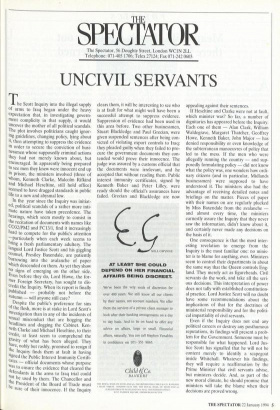SPECTATOR OR
The Spectator, 56 Doughty Street, London WC1N 2LL Telephone: 071-405 1706; Telex 27124; Fax 071-242 0603
UNCIVIL SERVANTS
The Scott Inquiry into the illegal supply of arms to Iraq began under the heavy expectation that, in investigating govern- ment complicity in that supply, it would uncover the mother of all political scandals. The plot involves politicians caught ignor- ing guidelines, changing policy, lying about it, then attempting to suppress the evidence in order to secure the conviction of busi- nessmen whose supposedly criminal actions they had not merely known about, but encouraged. In apparently being prepared to see men they knew were innocent end up in prison, the ministers involved (three of whom, Kenneth Clarke, Malcolm Rifkind and Michael Heseltine, still hold office) seemed to have dragged standards in public life to a new and abysmal low. In the year since the Inquiry was initiat- ed, political scandals of a rather more inti- mate nature have taken precedence. The hearings, which seem mostly to consist in the recitation of documents with names like C032/PM2 and FC13/1, find it increasingly hard to compete for the public's attention --particularly when each week seems to bring a fresh parliamentary adultery. The languid Lord Justice Scott and his giggling Counsel, Presiley Baxendale, are patiently burrowing into the avalanche of paper which descended on them. As yet they show no signs of emerging on the other side. Even before they do, Lord Howe, the for- mer Foreign Secretary, has sought to dis- credit the Inquiry. When its report is finally Published — probably not before the autumn — will anyone still care?
Despite the public's preference for sins
of the flesh, more is at stake in Lord Scott's Investigation than in any of the incidents of Sexual misconduct that are hogging the
headlines and dogging the Cabinet. Ken- neth Clarke'and Michael Heseltine, to their credit, at least seem to comprehend the gravity of what has been alleged. They have, nobly but rashly, promised to resign if the Inquiry finds them at fault in having signed the Public Interest Immunity Certifi- cates — official documents whose purpose Was to ensure the evidence that cleared the
defendants in the arms to Iraq trial could not be used by them. The Chancellor and
the President of the Board of Trade must be sure of their innocence. If the Inquiry clears them, it will be interesting to see who is at fault for what might well have been a successful attempt to suppress evidence. Suppression of evidence had been used in this area before. Two other businessmen, Stuart Blackledge and Paul Grecian, were given suspended sentences after being con- victed of violating export controls to Iraq: they pleaded guilty when they failed to pro- cure the government documents they con- tended would prove their innocence. The judge was assured by a customs official that the documents were irrelevant, and he accepted that without reading them. Public interest immunity certificates, signed by Kenneth Baker and Peter Lilley, were ready should the official's assurances have failed. Grecian and Blackledge are now appealing against their sentences.
If Heseltine and Clarke were not at fault, which minister was? So far, a number of dignitaries has appeared before the Inquiry.
Each one of them — Alan Clark, William Waldegrave, Margaret Thatcher, Geoffrey Howe, Kenneth Baker, John Major — has denied responsibility or even knowledge of the subterranean manoeuvres of policy that led to the mess. If the men who were allegedly running the country — and sup- posedly formulating policy — did not know what the policy was, one wonders how ordi- nary citizens (and in particular, Midlands businessmen) were supposed to have understood it. The ministers also had the advantage of receiving detailed notes and briefings on the matter. Pieces of paper with their names on are regularly plucked by Miss Baxendale from the avalanche and almost every time, the ministers earnestly assure the Inquiry that they never saw the information, didn't know about it, and certainly never made any decisions on the basis of it.
One consequence is that the most inter- esting revelation to emerge from the Inquiry is the most familiar one: no minis- ter is to blame for anything, ever. Ministers seem to control their departments in about the same way that the Queen controls Eng- land. They merely act as figureheads. Civil servants do the work, and take all the seri- ous decisions. This interpretation of power does not tally with established constitution- al practice. Lord Justice Scott will no doubt have some recommendations about the implications of that for the doctrines of ministerial responsibility and for the politi- cal impartiality of civil servants.
Even if the Inquiry does not end any political careers or destroy any posthumous reputations, its findings will present a prob- lem for the Government. Someone must be responsible for what happened. Lord Jus- tice Scott has signalled that he will not be content merely to identify a scapegoat inside Whitehall. Whatever his findings, they will require a reaffirmation by the Prime Minister that civil servants advise, but ministers decide. And, as part of the new moral climate, he should promise that ministers will take the blame when their decisions are proved wrong.


















































 Previous page
Previous page